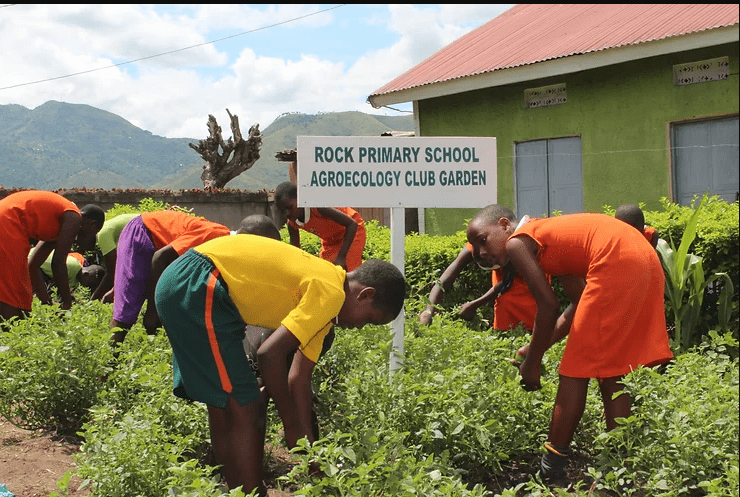Malnutrition is a global concern that affects both children and adults. The rapid evolution of food systems to feed the ever-growing populations has resulted in a deterioration in the nutritional value of regularly consumed foods, as more emphasis is on food security and little attention on nutrition security. Malnutrition is an enormous challenge in Uganda, affecting a significant number of children due to diet deficiencies. Malnutrition is on the rise, especially in academic institutions with monotonous meal schedules thus ensuring healthy nutrition, especially among children, is not only ideal in fundamental nature, but also in practice because it facilitates efforts to achieve SDGS 2 and 3. Addressing hunger demands a multi-sectoral approach, because nutrition is no longer just a health issue but everyone’s concern.
ESAFF Uganda recognized the agroecology knowledge gap in the agriculture curriculum for academic intuitions, thus the first Agroecology Clubs were established in 2019 during the first National Organic Week (NOW), an annual event aimed at raising awareness about organic farming among small-scale farmers and consumers throughout the country.
The Agroecology Club is a community within a learning institution where students/pupils can gain practical experience with sustainable food systems. The Agroecology Clubs aim to promote sustainable agriculture, highlight the importance of integrating agroecology into the school curriculum, and supplement monotonous school food menus with dietary diversity. To upscale this initiative, ESAFF Uganda partners with different development partners like Agroecology Fund and Humundi to facilitate and strengthen the club structures in the various districts across Uganda. These efforts are intended to support the transition to a more ecofriendly and sustainable food system. The clubs organize activities such as tree planting, agroecology poem writing competitions, school quizzes and debates, and agroecology gardens, which provide hands-on experience with various agroecological practices while supplementing school diets to ensure proper nutrition for both teachers and students.
Agroecology gardens in schools offer a holistic approach to improving nutrition by increasing access to fresh, nutritious food while simultaneously fostering education, advancing healthy diets, and cultivating environmental stewardship in students and the larger community. Members of the Agro ecology Clubs are guided to identify a study field within the school premises where they learn how to produce their own food, such as fruits and vegetable while employing agro ecological principles first-hand. These undertake practices like making compost manure, mulching, irrigation, production and use of organic pesticides and integration of livestock to strengthen ecological interaction. This not only teaches members vital and sustainable agricultural skills, but it also promotes a greater appreciation for fresh, nutritious meals for a healthy diet at school.
Ms. Mary Goretti Ithungo, patron of the Agroecology Club at Rock Primary School in Kasese district, described her experience with the agroecology garden and its transformation. The small garden has substantially improved the school diet by providing the beneficial advantage of consuming safely grown food; some of the students now appear healthier, Mary noticed. The students actively participate in the entire production process, and their enthusiasm for agroecology is palpable.
Kasese district is dominated by chemical fertilizers and pesticides which poses various hurdles in accelerating the agroecological transition. However, members of this Agroecology Club were tasked with transferring knowledge and practice back home, and as a result, many students now own smaller plots for agroecological demonstration at home, which contribute significantly to household food and nutrition security. To achieve this, the school had to involve those parents who did not believe in the role of agroecology in food and nutrition security. The school continues to get testimonies from both children and parents about how the smaller plots have resulted in increased access and availability of safe and nutritious foods and also improved the nutritional status of at household level. This has ignited a gradual transition to agroecological farming, which is the shift that ESAFF Uganda desires to see.
The agroecology gardens provide a variety of nutritious crops and foods like amaranths, garden eggs, tomatoes, matooke, cabbages, eggplants, onions, Nakati, Ovacado, guavas, and mangoes among others exposing students to diverse vital nutrients and flavors from fruits, vegetables, and herbs. Students can choose wholesome options over processed foods from the market when they actively participate in the growing and preparation of their own food. While engaging, Mr. George Raymond Wauya, the director Divine Power Nursery and Primary School in Mbale district, the acknowledged that the Agroecology garden is not a mere act by the club members but has been vital in ensuring availability of safe food for the school and neighboring community especially during the food scarcity period. Raymond is amazed by the contribution of the agroecology garden in the school. He also noted that many of the pupils looked undernourished and as a school administration, they have given such children more attention when it comes to food nutrition, many of them look much better compared to the prior times before the establishment of the Agroecology Club within the school.
Addressing malnutrition in Uganda calls for collaboration with various actors thus this knowledge does not only end in the schools but is transferred to the outside community in order to create a wider impact and promote sustainable solutions for improved health and nutrition. By increasing investment in agroecological initiatives that raise a generation of students who understand and are committed to sustainable food systems, a more resilient and equitable food future is achievable.
This article first appeared on the ESAFF website and has only been edited for its title.

